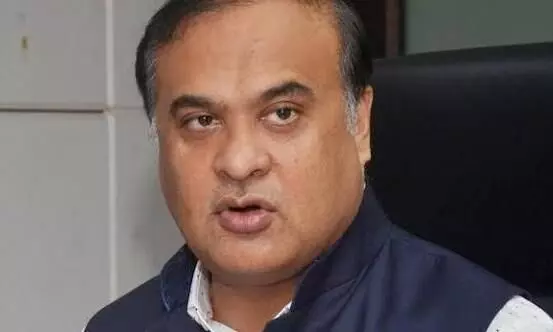
Assam government discloses religion-based data of NRC exclusions for the first time
text_fieldsHimanta Biswa Sarma (PTI photo)
Guwahati: Assam's Chief Minister, Himanta Biswa Sarma, has unveiled the religion-wise breakdown of exclusions from the state's National Register of Citizens (NRC) for the first time.
Sarma disclosed that out of the 16 lakh individuals excluded from the final NRC draft, seven lakh were Muslims, while five lakh were Bengali Hindus. Additionally, there were two lahks Assamese Hindus, belonging to the Axomiya and Koch-Rajbongshi communities, and 1.5 lakh Gorkhas on the list.
However, Sarma did not specify the identity of the remaining 3.5 lakh individuals.
This revelation marks the first time the government has provided details categorized by religion from the NRC, which was conducted under the supervision of the Supreme Court and published on August 31, 2019.
Sarma has also made predictions regarding the number of people expected to apply for Indian citizenship under the newly introduced rules of the Citizenship Amendment Act (CAA). He anticipates a significantly lower figure, estimating that only "3 to 6 lakh people will apply with CAA and not 20, 18, or 15 lakhs or 1.5 crores, which some people are claiming."
Expressing concerns over the implementation of the CAA in Assam, Sarma termed it a potential "fiasco" for the state. He voiced apprehension over the impact of the law on the indigenous culture of Assam, particularly regarding the fast-track citizenship provision for persecuted non-Muslim minorities from Bangladesh, Pakistan, and Afghanistan.
The CAA, enacted in December 2019, had previously sparked widespread protests and discontent in Assam.
Sarma emphasized the need to assess the ground reality, asserting that the actual number of applicants under the CAA would become evident by April 19.
He cited examples of challenges faced by Hindu Bengali families who migrated to Assam from Bangladesh after March 25, 1971, the cutoff date for Indian citizenship eligibility. Many of these families were allegedly excluded from the NRC due to the rejection of refugee registration cards issued by border authorities during the NRC updation process under former state coordinator Prateek Hajela.
Last year, the Assam government initiated an inquiry against Prateek Hajela, who oversaw the NRC exercise, over alleged irregularities in the updating process. Sarma highlighted discrepancies in the treatment of documentation by Hajela, which resulted in the exclusion of many eligible individuals from the NRC.
Hajela, an IAS officer of the Assam-Meghalaya cadre, was appointed as the NRC coordinator by the Supreme Court in 2019 to supervise the comprehensive exercise aimed at identifying undocumented residents in Assam.





